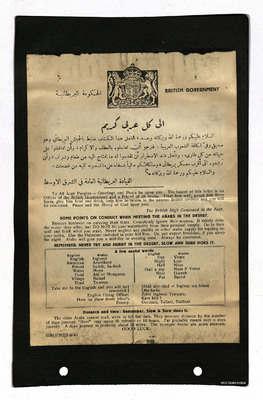Notes for Communicating with Arabs
Title
Notes for Communicating with Arabs
Description
A document in English and Arabic asking for help, explaining how to behave with Arabs, including a few words in Arabic and an explanation of the perception of distance.
Creator
Language
Type
Format
One printed sheet on an album page
Publisher
Rights
This content is available under a CC BY-NC 4.0 International license (Creative Commons Attribution-NonCommercial 4.0). It has been published ‘as is’ and may contain inaccuracies or culturally inappropriate references that do not necessarily reflect the official policy or position of the University of Lincoln or the International Bomber Command Centre. For more information, visit https://creativecommons.org/licenses/by-nc/4.0/ and https://ibccdigitalarchive.lincoln.ac.uk/omeka/legal.
Identifier
PSaundersEJ20010096
Transcription
[Arabic text] [crest] BRITISH GOVERNMENT
[Arabic text]
To All Arab Peoples – Greetings and Peace be upon you. The bearer of this letter is an Officer of the British Government and a friend of all Arabs. Treat him well, guard him from harm, give him food and drink, help him to return to the nearest British soldiers and you will be rewarded. Peace and the Mercy of God upon you.
[italics] The British High Command in the East. [/italics]
SOME POINTS ON CONDUCT WHEN MEETING THE ARABS IN THE DESERT.
Remove footwear on entering their tents. Completely ignore their women. If thirsty drink the water they offer, but DO NOT fill your waterbottle from their personal supply. Go to their well and fetch what you want. Never neglect any puddle or other water supply for topping up your bottle. Use the Halazone included in your Aid Box. Do not expect breakfast, if you sleep the night. Arabs will give you a mid-day or evening meal. Always be courteous.
REMEMBER, NEVER TRY AND HURRY IN THE DESERT, SLOW AND SURE DOES IT.
A few useful words.
Euglish [sic] – Arabic
English – Ingleezi
American – Amerikani
Friend – Sa-hib, Sa-deck
Water – Moya
Food – Akl or Mungarea
Village – Balaad
Tired – Ta-eban
English – Arabic
Day – Yome
Night – Layl
Half – Nuss
Half a day – Nuss il Yome
Near – Gareeb
Far – Baeed
Take me to the English and you will be rewarded. – Hud nee eind el Ingleez wa tahud Mu-ka-fa.
English Flying Officer. – Zabit Ingleezi Tye-yara.
How far (how many kilos?). – Kam kilo?
Enemy. – Germani, Taliani, Siziliani.
Distance and time: Remember, Slow & Sure does it.
The older Arabs cannot read, write or tell the time. They measure distance by the number of days journey. “Near” may mean 10 minutes or 10 hours. Far probably means over a days journey. A days journey is probably about 30 miles. The younger Arabs are more accurate.
GOOD LUCK.
5581/PMEB-4/43
[Arabic text]
To All Arab Peoples – Greetings and Peace be upon you. The bearer of this letter is an Officer of the British Government and a friend of all Arabs. Treat him well, guard him from harm, give him food and drink, help him to return to the nearest British soldiers and you will be rewarded. Peace and the Mercy of God upon you.
[italics] The British High Command in the East. [/italics]
SOME POINTS ON CONDUCT WHEN MEETING THE ARABS IN THE DESERT.
Remove footwear on entering their tents. Completely ignore their women. If thirsty drink the water they offer, but DO NOT fill your waterbottle from their personal supply. Go to their well and fetch what you want. Never neglect any puddle or other water supply for topping up your bottle. Use the Halazone included in your Aid Box. Do not expect breakfast, if you sleep the night. Arabs will give you a mid-day or evening meal. Always be courteous.
REMEMBER, NEVER TRY AND HURRY IN THE DESERT, SLOW AND SURE DOES IT.
A few useful words.
Euglish [sic] – Arabic
English – Ingleezi
American – Amerikani
Friend – Sa-hib, Sa-deck
Water – Moya
Food – Akl or Mungarea
Village – Balaad
Tired – Ta-eban
English – Arabic
Day – Yome
Night – Layl
Half – Nuss
Half a day – Nuss il Yome
Near – Gareeb
Far – Baeed
Take me to the English and you will be rewarded. – Hud nee eind el Ingleez wa tahud Mu-ka-fa.
English Flying Officer. – Zabit Ingleezi Tye-yara.
How far (how many kilos?). – Kam kilo?
Enemy. – Germani, Taliani, Siziliani.
Distance and time: Remember, Slow & Sure does it.
The older Arabs cannot read, write or tell the time. They measure distance by the number of days journey. “Near” may mean 10 minutes or 10 hours. Far probably means over a days journey. A days journey is probably about 30 miles. The younger Arabs are more accurate.
GOOD LUCK.
5581/PMEB-4/43
Collection
Citation
British High Command, Egypt, “Notes for Communicating with Arabs,” IBCC Digital Archive, accessed July 3, 2024, https://ibccdigitalarchive.lincoln.ac.uk/omeka/collections/document/25543.
Item Relations
This item has no relations.

